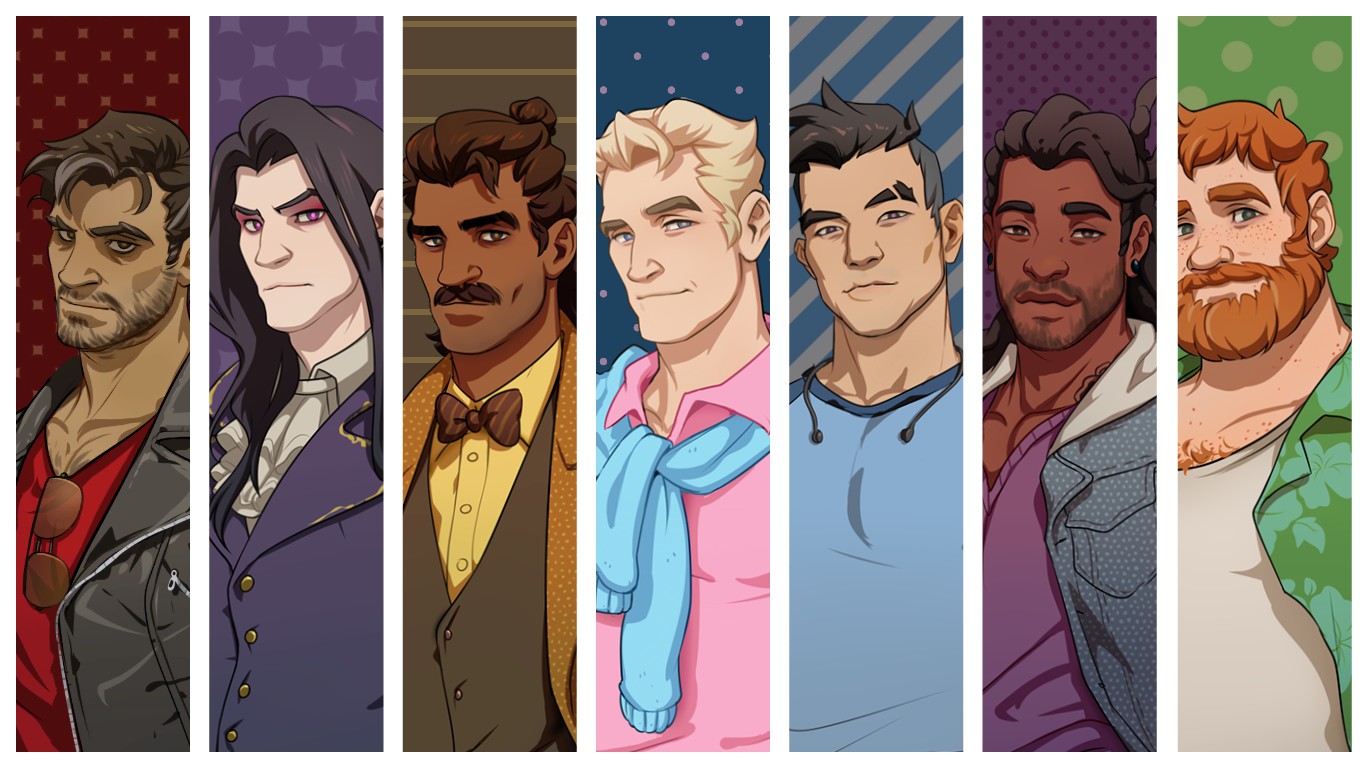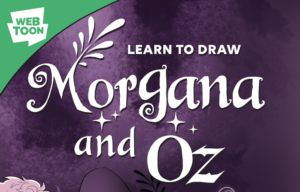If you haven’t heard of Dream Daddy, it’s a dating simulator for dads — you’re a dad, the dates are dads, everyone is dads and nothing hurts.
It costs $15 and it is worth every penny.
So, here’s the dealio:
You and your daughter, Amanda, move to a cute new neighborhood during her last year of high school. Your new home is located in a cul-de-sac which contains seven other hot and romanceable dads.
[Pictured from left to right:
Bad Dad, Goth Dad, Sports Dad, Jesus Dad, Music Dad, Professor Dad, Dad Dad]
This game has gained a lot of popularity very quickly, in large part because the writers have taken explicit steps towards LGBTQ representation. It’s a game about queer characters in queer relationships where none of the story arcs are about being queer. Some of the dads have been with women, some of the dads have been with men; some of the dads are cis, some of the dads are trans. Their sexual and gender identities are accepted without question, so the story can focus on their interests and personalities (for example: Goth Dad’s Naruto fanfiction or Music Dad’s social anxiety).
But wait! There’s more! If you liked thoughtful representation, then let me tell you about complex characterization (ooh) and a diverse range of charming interests (wow)! Every single one of these dads is absolutely enchanting, I swear to god.
Goth Dad’s Dadbook profile, a cell-phone picture from my twitter feed, 2017
Full disclosure: I started this game thinking that I would have no interest in straying from the Music Dad=>Professor Dad=>Dad Dad side of this continuum, but the more Dads you romance, the more you learn/the more you want to learn about the other Dads and their families (because these characters are friends with each other! because they exist in a dynamic community!).
I’ll admit that it was very shortsighted of me to think that this game, which I first heard about because the character creator had binder options for trans dads, would stick to basic dad-personality stereotypes (e.g., Bad Dad) rather than subverting those stereotypes in surprising and delightful ways (e.g., dog-loving cryptid enthusiast crippled by self-doubt). The more time you spend with these characters, the more the writing persuades you to think of them as fragile and complex individuals who should be handled with love and care.
Bro! You work too hard, bro! You deserve to sleep in on a Saturday, bro!
And that’s really what sets this game apart from your standard dating simulator: the writing is incredibly engaging and the characters are beautifully developed; these two things work together to point to truths about emotional maturity that the average dating sim will often ignore.
Standard operating procedure in the dating simulator genre (or even just in games with romance options) generally is: talk to your sweetheart regularly and give them presents until you amass enough romance points that they’ll marry you; or, figure out what your sweetheart wants to hear and then say it until they love you. This procedure frames romance as a kind of emotional transaction. Even in games I love like Harvest Moon or Stardew Valley, you treat your preferred love-interest like a machine — you put time and gifts/money in, and you get emotional validation/sex out.
Almost all of the negative feedback surrounding Dream Daddy focuses on its deviation from this norm; some of Dream Daddy’s romanceable Dads won’t sleep with you or won’t commit to you, even if you say all the right things.
Now, I can understand the argument that these are video games, and people play video games to escape from reality — when you’ve faced these kinds of romantic issues in real life (where you really like someone and they really like you too, but the timing is just wrong) coming up against that in your preferred method of escapism can hurt all the more.
But, games that adhere to the genre’s standard romantic procedure teach emotional transactionalism — and the more games existing in the world and operating on that system, the more normalized that mindset becomes. And that’s why we need games like Dream Daddy or Rose of Winter — games that treat their characters like real people, with conflicting desires and responsibilities — to balance out all of the more escapist games that already exist.
Also, I’d like to say again: even if you can’t get the happy ending you want with some of these dads, there are other dad-fish in the dad-sea, and every single one of them is Absolutely Enchanting.
Say it again, baby.
When it comes right down to it, video games are just another narrative medium — like movies, like television, they’re a tool for telling stories and they can/should be used to tell all the kinds of stories available to tell. That mandate (ha — get it? because you go on dates with men!) includes stories that erase the obstacles of reality, but it also includes stories that are sad or disappointing, stories with characters who delight and surprise you, stories that hit a little too close to home (when I first tried to romance Professor Dad, he told me he thought of me as just a friend — it stung, I’ll admit it); and, most importantly, it means stories that maybe don’t get told very often — say, stories about queer dads.








